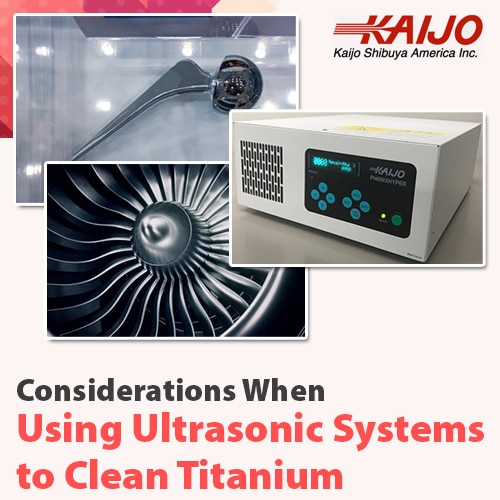Considerations When Using Ultrasonic Systems to Clean Titanium
May 10, 2022
 The use of parts made from titanium metal or titanium alloys is common in industrial sectors where strength and low weight are important. In addition to being hard and light, titanium is resistant to many solvents and chemicals that could damage other metals. This combination of characteristics means that titanium parts are ideal candidates for cleaning using industrial ultrasonic cleaning systems.
The use of parts made from titanium metal or titanium alloys is common in industrial sectors where strength and low weight are important. In addition to being hard and light, titanium is resistant to many solvents and chemicals that could damage other metals. This combination of characteristics means that titanium parts are ideal candidates for cleaning using industrial ultrasonic cleaning systems.
Where traditional cleaning methods require manual scrubbing, soaking for extended periods in toxic chemicals, or the use of abrasive materials, ultrasonic cleaning can be carried out using plain water or a mild detergent. Because the surfaces of parts made with titanium or titanium alloys are very hard, low ultrasonic frequencies can be used to deliver rapid and powerful cleaning action. Other considerations for the use of industrial ultrasonic cleaners depend mainly on the type of contaminant that has to be removed.
Why Titanium Parts Often Have to Be Cleaned Both After Manufacturing and Before Use
Depending on where they are used, products made of titanium may have to be cleaned more than once between manufacturing and final use. Titanium is extracted from ore containing the metal along with other minerals. It is produced as a shiny silver metal with a high melting point and good malleability. It can be machined, formed, or cast to produce parts for the aerospace and medical industries, but the manufacturing process leaves residues that have to be removed.
Titanium parts for the aerospace industry include parts for jet engines, landing gear, and spacecraft. Because it is stronger than steel and lighter, it is used in high-stress areas. In military jets, a large percentage of the plane may be made from titanium and titanium alloys. Missiles may contain titanium parts and jet engines use it for its high melting point. All these parts have to be cleaned before use. Many are cleaned at the factory to remove shop dirt, machining oil residue, or other shop contaminants, but additional cleaning may be necessary before final use if additional fabrication steps such as welding are required.
Many medical implants and other medical devices are made from titanium because the metal is harmless for living tissues and it is highly biocompatible. For implants, bone bonds tightly with titanium and it has similar flexibility to human bones. While medical titanium parts have normally been cleaned at the factory, they may pick up contaminants during shipping, in storage, or at the medical facility. Contaminated implants can lead to infection and disease and may cause the implant to fail. Medical implants and devices have to be completely clean and sterile before being used on patients.
How Industrial Ultrasonic Systems Clean Titanium Parts
Industrial ultrasonic cleaners produce microscopic cavitation bubbles in the cleaning solution and the bubbles deliver a scrubbing action to dislodge surface contaminants. Because titanium is strong and hard, lower frequencies with comparatively large bubbles and more powerful cleaning can be used. Parts with heavy surface contamination can be cleaned quickly at 26 kHz while 38 kHz is effective for lighter contamination and for fine particle cleaning. If there is oil and grease on part surfaces, the cleaning solution can be heated and a mild detergent can improve cleaning performance. To obtain clean and sterile parts in medical applications, a disinfectant can be added to the cleaning solution to sterilize medical devices. In each case, the ultrasonic cleaning system will clean titanium parts more quickly and completely than traditional cleaning methods.
Expertise and Solutions Kaijo Provides in Ultrasonic Cleaning
As one of the leading ultrasonic cleaner manufacturers, Kaijo can help customers select the right system for their titanium part cleaning application. Kaijo provides innovative ultrasonic cleaning solutions and works with customers to ensure that the system they use for their application meets their cleaning requirements. Contact Kaijo to schedule a free consultation to discuss your specific cleaning application.





